EU deploys 32 short-term observers
The European Union Election Observation Mission (EU EOM) on Friday deployed a third contingent of 32 more short-term observers in the country, taking the number of the EU observes to 60.
Beginning April 2019, the mission has deployed 28 members, including long-term observers and the core team.

Speaking in Blantyre, chief observer Miroslav Poche, who is also a member of the European Parliament, said the observers will be the eyes and ears of the mission across the country.
“The short-term observers will enable our coverage of nearly all the districts in Malawi, observing in both urban and rural areas. Together with the other EU EOM observers they will be the eyes and the ears of the mission on election day during polling, counting and tallying of results,” Poche said in a statement signed by EU Election Observation Mission Malawi 2019 press officer Michela Sechi.
Sechi said in the press release that prior to their deployment, the short-term observers received a two-day in-depth briefing on the legal framework, electoral background and preparations, voting procedures, the political environment and other topics.
She said the short-term observers will be supplemented by a small group of observers drawn from among diplomats from EU member States accredited in Malawi making the number of EU EOM observers on election day to reach 83.
“The EU EOM observers will be visiting many polling stations from the opening to the closing of the polls. They will not interfere in the process. They are there to watch and take note of how the voting is conducted, assessing issues such as respect of the right to vote, secrecy of the vote, performance of polling staff members, the role of monitors and domestic observers, women’s participation. During the counting, observers will assess the transparency, accuracy and integrity of the process,” she said adding, EU EOM will issue a preliminary statement two days after the elections.
In 2014, EU made 27 recommendations, including a clear definition of the term ‘public office’ into the election legislation to increase the legal certainty regarding the eligibility criteria for the nomination of candidates.
Other recommendations included harmonisation of the time-frames relating to the dissolution of Parliament, nomination of candidates, campaign period and election day. EU said this would increase consistency in the legislation and ensure legal certainty regarding the right of incumbent parliamentarians to stand for election and regarding the length of the campaign. n





